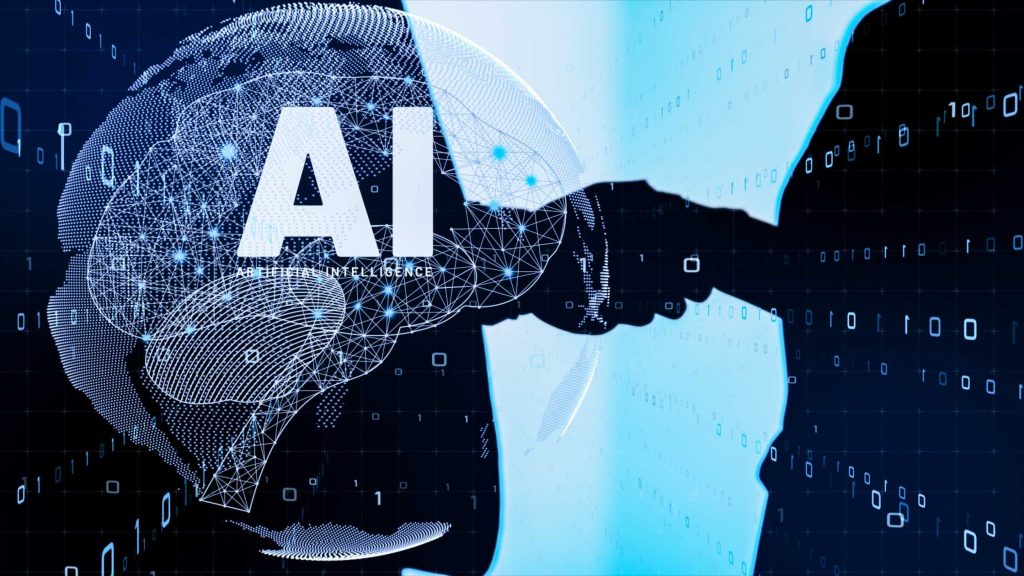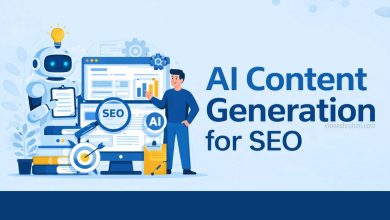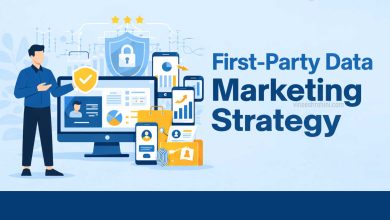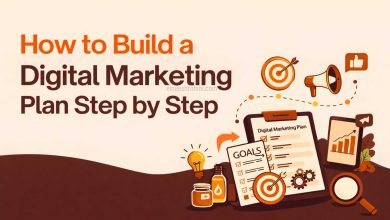How Companies Are Using AI In Digital Marketing ? : Comprehensive Guide 2024
AI In Digital Marketing : Artificial Intelligence (AI) is revolutionizing industries across the globe, and digital marketing is no exception. In today’s fast-paced digital world, companies are leveraging AI to enhance their marketing strategies, improve customer experiences, and boost efficiency.
Table of Contents
From personalized recommendations to chatbots, AI is transforming the way businesses interact with their customers. This essay explores how companies are using AI in digital marketing, examining its various applications, benefits, and challenges.
Understanding AI in Digital Marketing

Artificial Intelligence refers to the simulation of human intelligence processes by machines, particularly computer systems. These processes include learning (acquiring data and rules for using it), reasoning (using rules to reach conclusions), and self-correction. In digital marketing, AI enables companies to analyze data, predict trends, automate tasks, and create highly personalized customer experiences.
Key Applications of AI in Digital Marketing
1. Personalization
One of the most significant contributions of AI in digital marketing is its ability to deliver personalized experiences to users. Companies use AI algorithms to analyze customer data, including browsing history, purchase patterns, and preferences. This data enables marketers to create targeted campaigns and recommend products or services that align with individual customer needs.
Also Read : 10 Best AI SEO Tools for Optimizing Your Website in 2024
For example, e-commerce giants like Amazon and Netflix rely heavily on AI to provide personalized recommendations. By analyzing user behavior, these companies can suggest products or content that a customer is likely to engage with, thereby increasing conversion rates and customer satisfaction.
2. Chatbots and Virtual Assistants
Chatbots and virtual assistants powered by AI are transforming customer service in digital marketing. These tools provide instant, 24/7 support to customers, answering queries, resolving issues, and guiding them through the buying process.
For instance, companies like Sephora use AI-powered chatbots to assist customers in finding products, offering beauty tips, and even scheduling appointments. These chatbots not only enhance customer experiences but also free up human resources for more complex tasks.
3. Predictive Analytics
Predictive analytics involves using AI to analyze historical data and predict future trends. Marketers leverage this technology to forecast customer behavior, optimize campaigns, and allocate resources more effectively.
For example, Google Ads employs predictive analytics to help advertisers target the right audience. By analyzing user behavior and preferences, AI can predict which ads are most likely to resonate with specific demographics, thereby maximizing ROI.
4. Content Creation
AI is also being used to generate content for digital marketing campaigns. Tools like GPT (Generative Pre-trained Transformer) can create engaging blog posts, social media captions, and even ad copy. This technology saves time and ensures consistency in brand messaging.
A notable example is the Associated Press, which uses AI to automate the creation of news articles and reports. Similarly, companies like HubSpot employ AI to suggest content topics and optimize headlines for better performance.
5. Email Marketing
AI is revolutionizing email marketing by enabling hyper-personalization. Marketers use AI to analyze customer data and segment their email lists, ensuring that each recipient receives content tailored to their interests and behaviors.
Platforms like Mailchimp integrate AI to optimize email campaigns. They provide insights on the best times to send emails, suggest subject lines, and even predict the likelihood of recipients opening an email. This level of personalization increases engagement and improves campaign performance.
6. Voice Search Optimization
With the rise of voice-activated devices like Amazon Alexa and Google Assistant, voice search has become a critical aspect of digital marketing. AI helps companies optimize their content for voice search by understanding natural language patterns and user intent.
For example, Domino’s Pizza leverages AI to enable customers to order pizzas through voice commands. By integrating voice search optimization into their strategy, companies can reach a broader audience and provide seamless user experiences.
7. Dynamic Pricing
AI enables companies to implement dynamic pricing strategies by analyzing market trends, competitor pricing, and customer demand. This approach ensures that prices remain competitive while maximizing profitability.
For instance, airlines and hotel chains use AI-powered dynamic pricing algorithms to adjust rates based on demand and other factors. This not only boosts revenue but also enhances customer satisfaction by offering fair and competitive prices.
8. Programmatic Advertising

Programmatic advertising uses AI to automate the buying and placement of ads in real time. This technology ensures that ads are shown to the right audience at the right time, optimizing ad spend and improving campaign performance.
Companies like Google and Facebook use AI-driven programmatic advertising to deliver highly targeted ads. By analyzing user data, AI can determine the most relevant audience for a particular ad, thereby increasing its effectiveness.
9. Social Media Management
AI-powered tools are transforming social media management by automating tasks like scheduling posts, analyzing engagement metrics, and identifying trends. These tools help marketers save time and focus on creating impactful content.
For example, platforms like Hootsuite and Buffer integrate AI to provide insights on the best times to post, suggest content ideas, and even monitor brand sentiment across social media channels. This allows companies to maintain a consistent online presence and engage with their audience effectively.
10. Customer Journey Mapping
AI enables companies to map out customer journeys by analyzing data from various touchpoints. This helps marketers understand how customers interact with their brand and identify areas for improvement.
For instance, Salesforce uses AI to provide insights into customer journeys, allowing companies to deliver personalized experiences at every stage of the buying process. This level of understanding enhances customer satisfaction and drives loyalty.
Benefits of Using AI in Digital Marketing
1. Improved Efficiency
AI automates repetitive tasks like data analysis, content creation, and customer support, allowing marketers to focus on strategic initiatives. This improves overall efficiency and productivity.
2. Enhanced Personalization
AI enables companies to deliver highly personalized experiences, which are crucial for building strong customer relationships. By understanding individual preferences, businesses can create targeted campaigns that resonate with their audience.
3. Better Decision-Making
AI provides actionable insights by analyzing large volumes of data. This helps marketers make informed decisions, optimize campaigns, and allocate resources effectively.
4. Cost Savings
By automating tasks and optimizing ad spend, AI helps companies reduce costs while maintaining high levels of performance.
5. Increased ROI
AI-driven strategies ensure that marketing efforts are targeted and effective, leading to higher conversion rates and increased ROI.
Challenges of Using AI in Digital Marketing
1. Data Privacy Concerns
The use of AI in digital marketing involves collecting and analyzing vast amounts of customer data. This raises concerns about data privacy and security, especially with stringent regulations like GDPR.
2. High Implementation Costs
Integrating AI into marketing strategies requires significant investment in technology and expertise. Small businesses may find it challenging to adopt AI due to limited budgets.
3. Dependence on Quality Data
AI’s effectiveness depends on the quality of data it analyzes. Inaccurate or incomplete data can lead to flawed insights and ineffective campaigns.
4. Complexity of AI Systems
AI technologies can be complex to implement and manage. Companies need skilled professionals to ensure that AI systems function correctly and deliver the desired outcomes.
5. Ethical Concerns
The use of AI in digital marketing raises ethical questions, such as the potential for bias in algorithms and the impact on jobs. Companies must address these concerns to maintain trust and credibility.
Future Trends in AI and Digital Marketing

1. AI-Driven Content Creation
As AI continues to advance, we can expect more sophisticated tools for generating high-quality content. These tools will enable marketers to create engaging content at scale.
2. Hyper-Personalization
AI will enable even greater levels of personalization, with campaigns tailored to individual preferences, behaviors, and real-time interactions.
3. Augmented Reality (AR) and Virtual Reality (VR)
AI-powered AR and VR technologies will transform digital marketing by creating immersive and interactive experiences for customers.
4. Voice Search Optimization
As voice search continues to grow, AI will play a critical role in optimizing content for voice queries, ensuring that companies remain visible in this evolving landscape.
5. Ethical AI
With increasing awareness of ethical concerns, companies will focus on developing AI systems that are transparent, unbiased, and aligned with societal values.
AI In Digital Marketing – Conclusion
AI is reshaping the digital marketing landscape, offering unprecedented opportunities for companies to engage with their customers, improve efficiency, and drive growth. From personalization and predictive analytics to chatbots and programmatic advertising, AI is enabling marketers to create more impactful and effective campaigns.
Buy Now : Top 300 AI Tools List
However, businesses must address challenges such as data privacy, high implementation costs, and ethical concerns to fully harness the potential of AI in digital marketing. As technology continues to evolve, the role of AI in digital marketing is set to become even more significant, paving the way for a future where marketing strategies are more intelligent, efficient, and customer-centric.



